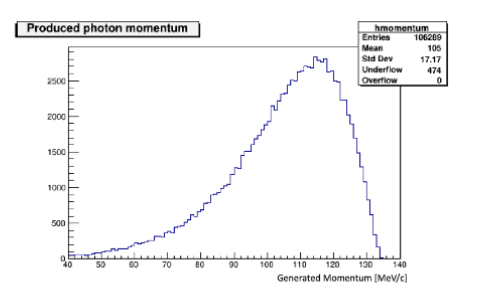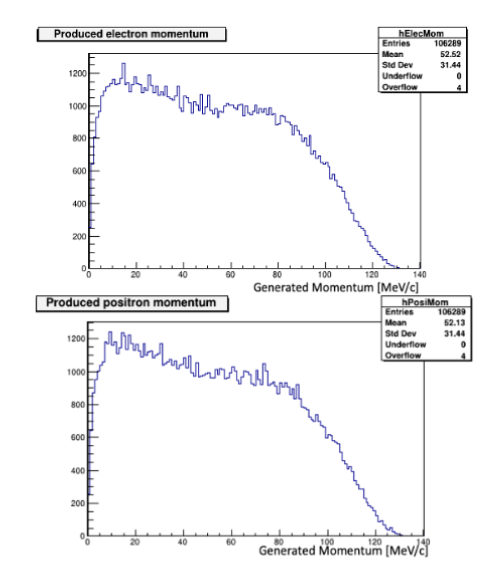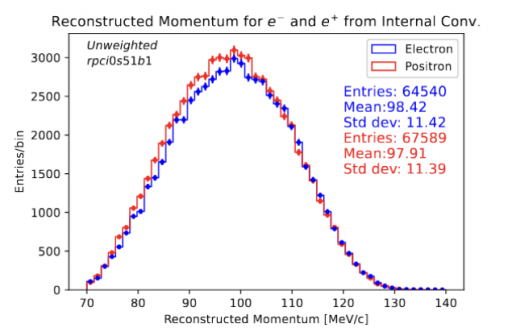User:Sophie/RPC: Difference between revisions
(→Plots) |
(→Plots) |
||
| Line 75: | Line 75: | ||
This next two plots show how these appear when passed through our reconstruction (taken from SU2020) | This next two plots show how these appear when passed through our reconstruction (taken from SU2020) | ||
[[File: | [[File:momint.png|512px|center|RPC elec and pos reco internal]] | ||
[[File: | [[File:momext.png|512px|center|RPC elec and pos reco internal]] | ||
And the time distribution (same for both internal and external): | And the time distribution (same for both internal and external): | ||
Revision as of 19:57, 16 December 2024
Channel Description
An important background to the Mu2e experiment is that originating from negatively charged pions produced at the primary production target. These pions can provide two potential sources of backgrounds to both signal channels if they stop on the Al Stopping Target and a radiative nuclear capture process occurs. There are two scenarios:
- External RPC where an outgoing (real) photon converts externally to an e^{+}e^{-}pair, most likely in one of the Al foils:
\begin{equation} \pi^{-} + N(A,Z) \rightarrow \gamma + N(A, Z-1) \rightarrow N(A, Z-1) + e^{+} + e^{-}, \end{equation}
where (A, Z - 1) is the daughter nucleus of the process.
- Internal conversion is related, but quantum mechanically independent:
\begin{equation} \pi^{-} + N(A,Z) \rightarrow N(A, Z-1) + e^{+} + e^{-}. \end{equation}
Here the e^{+}e^{-} pair is produced by an internal, virtual, photon. External Conversions and Internal Conversions can be categorized collectively as pion-capture backgrounds to the \mu^{-} --> e^{-} if the pair-produced electron has an energy consistent with a conversion-electron signature. Likewise, the outgoing positron can pose a background to the lepton number violating \mu^{-} --> e^{+}$ channel.
Although pion-capture backgrounds are sub-dominant they are the driving force behind the livegate optimization in our analysis.
In Mu2e we must characterize both in time RPC (that corresponding to stopped pion from the primary beam) and out of time RPC (which is a result of poor extinction). The latter should be minimized by the extinction system.
Literature
- Bistrilich et al: https://mu2e-docdb.fnal.gov/cgi-bin/sso/RetrieveFile?docid=469&filename=bistirlich_and_crowe.pdf&version=1 this paper details a study of the external photon spectrum. We use the spectrum measured for Mg.
- Kroll-Wada: https://journals.aps.org/pr/abstract/10.1103/PhysRev.98.1355 and Joseph: https://link.springer.com/article/10.1007/BF02860383 these papers detail the outgoing electron/positron spectra used in our generators for the internal scenario.
Generation in Mu2e
The RPCGun_module is based in Offline/EventGenerators. This can be run using the Production/JobConfig/primary/RPC.fcl file:
#include "Production/JobConfig/primary/TargetPiStopParticle.fcl"
physics.producers.generate : {
module_type : RPCGun
inputSimParticles: TargetPiStopResampler
verbosity : 0
RPCType : @nil
spectrum : {
spectrumShape : Bistirlich
elow : 1. #MeV
ehi : 140.
spectrumResolution : 0.1 #MeV
}
pionDecayOff : true # will apply surv prob
doHistograms : true
#SurvivalProbScaling : 1
}
physics.producers.FindMCPrimary.PrimaryProcess : @nil
The first include here adds in our target resampler. This samples a set of input stopped pions. The stopped pion campaign is not detailed here.
The photon spectrum shape is specified as "Bistirlich", that refers to the first author of the document above. The user can chose to make internal or external RPC events. The production of these differs:
- external RPC: the generator makes just the photons. Our G4 code then propagates these photons, pair production happens in the usual way in materials within the detector solenoid (target or elsewhere). As the photons tarvel through materials they can also produce other particles. Compton electrons distort the electron spectrum (see figure below).
- internal RPC: here there is a second stage to the generation. That is that the photon spectrum is resampled to produce electron positron pairs which follow the Kroll-Wada-Joseph parameterization.
The spectra for the photon and e^+e^- pair are stored in: Offline/Mu2eUtilities/inc/PionCaptureSpectrum.hh.
Since our pion beam campaign assumes infinite pion lifetime the actual survival time is stored as a weight by our generator (as an EventWeight object).
Plots
The following plot shows the generated photon spectra (uses Bistrilich et al)
The next two plots show the outgoing e^- e^+ spectra (uses Kroll-Wada-Joseph)
This next two plots show how these appear when passed through our reconstruction (taken from SU2020)
And the time distribution (same for both internal and external):
Configuring a Job
The make a set of internal or external RPC you must specify the RPCType e.g.:
physics.producers.generate.RPCType : "mu2eInternalRPC" physics.producers.FindMCPrimary.PrimaryProcess : "mu2eInternalRPC"
This can be done through simply running gen_Primary.sh:
generate_Primary.sh --primary RPCInternal --campaign MDC2020 --pver ah --sver p --type Piminus --njobs 1000 --events 4000
The "Cat" option can be used if you have a prefiltered set of stops (see next section).
Pion Filter
Since most pions decay before our digitization window begins (< 400 ns) we may want to simply select only pions which survive past this time and stop in our target and resample these. Of course, the selection efficiency must be stored and factored in later on.
The pion stop filter is stored in: Offline/EventGenerator/PionFilter_module.cc. It is configured as:
PionFilter : {
module_type : PionFilter
tmin : 350
tmax : 1e8
isNull : false
}
tmin is the chosen minimum time selection.
Contacts
Module Developers: Sophie Middleton, Andrei Gaponenko
Production: Yuri Oksuzian


